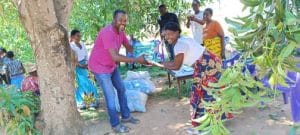The Co-operative Development Foundation of Canada (CDF Canada) has teamed up with the Manitoba Council for International Cooperation (MCIC) and the Malawi Federation of Cooperatives (MAEFCO) to support men and women farmers recover from Tropical Cyclone Freddy.
The affected farmers are from 12 co-operatives in the Mulanje, Zomba, and Machinga districts in southern Malawi.
The cyclone struck the African nation in March 2023 and significantly damaged crops, property, livestock, and infrastructure. Staple crops, such as rice, maize, and legumes were seriously affected, resulting in many households facing food insecurity.
To offset this problem, MCIC provided funding to CDF Canada and MAFECO to provide direct support to co-operative members impacted by this disaster.
Each co-op member received maize seeds, packets of assorted vegetable seeds and fertilizer. These materials supported farmers with their planting season.
 Selection criteria were developed to help the most in need. Co-op members who were women farmers, elderly, or were living with disabilities or with chronicle illnesses were prioritized for assistance. In addition, co-operative members, briefed on the project and its intended outcome, used the selection criteria to choose the most appropriate farmer.
Selection criteria were developed to help the most in need. Co-op members who were women farmers, elderly, or were living with disabilities or with chronicle illnesses were prioritized for assistance. In addition, co-operative members, briefed on the project and its intended outcome, used the selection criteria to choose the most appropriate farmer.
“Some of the farmers had already planted their maize because in Mulanje rains came earlier than most parts of the country, but due to the dry spells that we have been experiencing, they were forced to uproot their crops,” said Collins Kazembe, the Chair for Nalipiri Tea Co-operative from Mulanje District. “This package will be used to replant.”
CDF Canada also supports the 12 co-operatives and its members impacted by the cyclone. These co-operatives are part of the VOICE for Women and Girls Program (VOICE), a volunteer cooperation program, funded by the Government of Canada. VOICE aims to build the capacities of individual producers and primary co-operatives to support more inclusive, sustainable, and resilient growth.
After the cyclone, the Ministry of Agriculture, the Food and Agriculture Organization, and NASA Harvest assessed 11 districts to determine the cyclone’s impact on agriculture, livestock, and food security. About 69 per cent of the respondents reported damage to crops and 76 per cent had damage in their fields. The Zomba, Mulanje, Machinga districts had the largest average crop losses. Similarly, 40 per cent of farmers indicated they lost livestock and 96 per cent of smallholder farmers fear the current season’s harvest is not sufficient to meet their households’ food needs.
“When the cyclone affected the country, I was based in Karonga (Northern Region), and I was only following it through social media and news platforms. Now that I am here, I can notice the extent of the damage it left on people,” said Rodrick Mateauma, the District Commissioner for Machinga District Council. “You might think it’s little, but you have assisted in reducing the burden we had in providing support to these communities.”